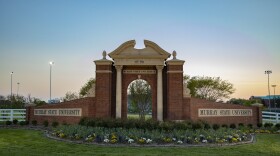Plans for a public-private partnership between Murray State University, a nonprofit and a developer to improve campus dining and housing facilities moved forward Thursday.
The university’s board of regents finance committee voted unanimously in favor of a motion authorizing MSU president Bob Jackson to execute a predevelopment agreement with RISE Real Estate and proceed with the development of a suitable financing model and land lease agreement for the project. The full board of regents will vote on the motion next week.
Finance committee board chair Leon Owens said this is just the next procedural step in a planning process that’s been gaining momentum since 2019.
“I know a lot of individuals have been involved in this discussion,” Owens said. “A lot of time and effort has been expended to provide information to the board of regents so we can have deliberations relevant to this project. This is not the final step, this is the next step.”
MSU vice president of finance and administrative affairs Jackie Dudley detailed the multi-phase campus improvement plan. The idea behind the public-private partnership, often referred to as a “P3,” is to leverage the experience and capabilities of partner organizations by financing the operations of a developer, RISE in this case, through a nonprofit organization – which will own the halls constructed and lease the land from the university – to share the financial risks and streamline the process.
“What can we do to better ourselves and not go through bidding ourself, not go through totally obtaining financing ourself … there’s just so many efficiencies you can gain through this process,” Dudley said.
This process will begin with the razing of Springer II (otherwise known as Old Franklin) this summer. The first construction phase will include replacing Hart Hall with two new residence halls that can house around 300 people each, the replacement of Winslow Dining Hall, enhancing the outdoor living and walking space in the north campus housing complex and evaluating next steps for Regents and White halls.
The new dining hall, Dudley said, could go on the former Springer II site. Preliminary plans include a three-story structure designed to look “like a food court” on the main floor with total seating for 550 people, about 25 seats less than Winslow’s current capacity. The building would also have additional meeting space and campus housing office space.
Other parts of the project include the development of more residential lawn green space and enhanced walking paths, as well as preserving the amount of parking spaces available on campus.
Dudley said this is all a part of an effort to improve the student experience on campus.
“The overall goal going into this was recruitment and retention of our students,” Dudley said. “That’s why we’re doing this.”
Board of regents vice chair Don Tharpe called the project “substantial” and sees it as a big deal for students living on campus.
“I guess it was an a-ha moment for me when [Dudley] talked about having the dormitories to be where the students could live on it a week and never need to get in their car and go anywhere,” he said.
MSU executed a license agreement – essentially a land access agreement – with Rise on May 3.
If approved by the full board of regents next week, the predevelopment agreement with RISE will have an effective date of June 3 and will run through March 1, 2023. This is for environmental surveys and tests and the beginning of the design documents. No payment would be due from MSU unless the university or RISE terminates the agreement or if the project becomes financially unviable. If the university continues the project through financing, RISE would then be paid for costs incurred.
A request for proposal for a 501c3 organization to finance the project through will also be issued by the board this summer.
The committee hopes to have a final agreement ready for review and approval by the board of regents as early as September. This would then need to be approved by the state before construction could begin. The committee is hopeful that work could start Dec. 8 and be completed in time for all buildings to open in fall 2024.
The entire board of regents finance committee meeting is available to stream on YouTube.





